Canada Begins Phaseout of Six Types of Single-Use Plastics
December 23, 2022
Canada's ban on single-use plastics began to take effect this week, with certain items no longer to be manufactured or imported into the country as of Tuesday, the government said in a news release.
The list of items includes checkout bags, cutlery, stir sticks, straws (with some exceptions) and foodservice ware made from or containing hard-to-recycle plastics.
Businesses will have a year to deplete their existing stocks before they are no longer allowed to sell these items in December 2023.
A sixth category of single-use plastics, plastic ring carriers for beverage six-packs, will be added to the list in June 2023.
The sale of flexible straws packaged with beverage containers will be prohibited as of June 2024.
Government officials estimate that the ban will avoid 1.3 million tons of plastic waste over the next 10 years in Canada.
Canadians consumed an estimated 160,000 mt of these single-use plastics in 2019, or about 5% of the total plastic waste generation in Canada that year, according to a regulatory impact analysis statement published by the government's department of health and department of the environment last year.
--Reporting by David Barry, dbarry@opisnet.com; Editing by Anna Matherne, amatherne@opisnet.com, and Barbara Chuck, bchuck@opisnet.com
© 2022 Oil Price Information Service, LLC. All rights reserved.
Eastman Plastic Recycling Plant in Tennessee Set for Completion in 2Q 2023
December 22, 2022
Eastman Chemical's plastic recycling plant at its Kingsport, Tenn. production facility will be "mechanically complete" in early 2Q 2023, company spokesperson Kristin Parker said on Wednesday. "Commercial production will follow later in 2023," she said.
The original completion date when Eastman announced it would build the plant in January 2021 was end-2022.
The cost to build the plant is estimated at $250 million. It will use the chemical methanolysis process to recycle polyethylene terephthalate (PET) scrap, including bottles, carpet, textiles and other landfill-bound plastic waste into specialty plastics. The plant's planned production capacity is
100,000 metric tons/year of plastic waste.
Eastman announced in September that European plastic recycler Interzero would provide up to 20,000 mt/year of "hard-to-recycle PET household packaging waste that would otherwise be incinerated" as feedstock for a chemical recycling plant Eastman is building in Normandy, France.
Reporting by Xavier A Cronin, xcronin@opisnet.com, Editing by David Barry, dbarry@opisnet.com
Plastic Rubbish From Ocean, Shorelines Recycled Into Lumber, Furniture
December 21, 2022
Plastic rubbish recovered from the ocean and shorelines in the Pacific Northwest, including massive fishing nets and beach trash, is being recycled into pellets used to make new lumber, furniture, clothing and other products, according to Gil Yaron, director of sales/marketing for Ocean Legacy Foundation.
The foundation's Ocean Legacy recycling plant in Richmond, British Columbia started operations last week, Yaron said in an interview. Legacy's partners include Full Circle Plastics of Nobelford, Alberta, Canada, which makes products like fence posts, parking curb blocks, and mini planters from recycled plastics. The plant's production capacity was not immediately available on Tuesday.
Legacy's plastic pellets will not be used to produce food grade plastic like bottles and packaging, in line with the foundation's mission of reducing single use plastic. "This plastic is being used to make durable products which will not end up back in the ocean," Yaron said. "It will not go back into packaging."
Ocean plastic is not to be confused with "ocean-bound" plastic, typically defined as plastic waste located within about 50 miles of waterways, assumed to eventually end up in oceans or other large bodies of water.
Legacy categorizes its ocean plastic into: used marine gear from fishing and aquaculture operations along the Pacific Coast, including fishing ropes, buoys, floats, and oyster trays; shoreline plastic rubbish recovered during cleanup expeditions along the Pacific Northwest coastline; and ocean plastics recovered during "ocean recovery expeditions."
"This makes plastic recycling viable and profitable, which provides us with an economically sustainable revenue stream," Yaron said. "Legacy Plastic allows companies to meet their sustainability goals to manufacture their products using local, high quality post-consumer recycled content resins that have a relatively lower carbon footprint when compared to virgin plastic production."
--Reporting by Xavier A. Cronin xcronin@opisnet.com; Editing by David Barry dbarry@opisnet.com and Michael Kelly, mkelly@opisnet.com
© 2022 Oil Price Information Service, LLC. All rights reserved.
First Indonesian Plastic Recycling Project Registers With Verra's Program
December 6, 2022
Bottled water company Danone-AQUA Indonesia has registered the country's first plastic recycling project with Verra's Plastic Waste Reduction Program, the carbon registry said Monday.
The Plastic Program issues credits based on the volume of plastic collected and/or recycled above baseline rates.
The Indonesian project is a collaboration between Danone-AQUA and waste management company Reciki.
It diverts plastic waste from landfills. High-value materials are then sorted and sold to large aggregators and/or directly to recyclers, and the hard-to-recycle residual plastics are repurposed.
The project, which aims to collect about 16,000 metric tons of plastic waste annually, has two material recovery facilities. More are planned in the next few years, focusing on areas where over 80% of plastics are estimated to be mismanaged.
Danone-AQUA developed this project as part of its commitment to recover more plastic than it uses by 2025.
Verra's Plastic Program includes a robust set of requirements that address social and environmental safeguards and ensure rigor and transparency through stakeholder consultations and documented monitoring, the registry said.
--Reporting by Abdul Latheef, alatheef@opisnet.com; Editing by Michael Kelly, mkelly@opisnet.com
© 2022 Oil Price Information Service, LLC. All rights reserved.
Texas Transportation Agency Allows Use of Plastic Pipe in Drainage Projects
November 22, 2022
The Texas Department of Transportation has approved the use of thermoplastic pipe in storm sewers and drain culverts, opening the door for increased usage of polyethylene and polypropylene drainage pipe in public projects in the state, a major pipe manufacturer said Monday.
Advanced Drainage Systems said in a news release it expects sales in the Texas stormwater drainage market to increase over the next several years as the state agency's contractors and engineers adopt thermoplastic pipe in their project designs.
The plastic pipe manufacturer is aiming to gain market share from the corrugated metal pipes and reinforced concrete pipes currently in use.
The new specification from the department includes thermoplastic pipe, joints and fittings, including high density polyethylene and polypropylene materials for use as pipe culverts and drains up to 48 inches in diameter.
The agency has yet to publish a list of approved thermoplastic pipe suppliers.
Infrastructure spending is expected to be a bright spot for PE demand in early 2023, at a time when reduced consumer spending and sustainability issues are pushing down growth in demand for plastics.
--Reporting by David Barry, dbarry@opisnet.com
--Editing by: Donna Todd, dtodd@opisnet.com, Adam Burkin, aburkin@opisnet.com, and Jeff Barber, jbarber@opisnet.com
©2022 Oil Price Information Service, LLC. All rights reserved.
Work on $1 Billion Plastic Recycling Plant in France Awaits Approval
October 27, 2022
Work on Eastman Chemical' s polyethylene terephthalate (PET) plastic recycling plant in Normandy, France, announced in January, has not yet begun "as we're still working through the consultation processes within the country," company spokeswoman Kristin Parker said on Thursday.
Eastman still expects the $1 billion plant to come online in 2025.
The plant would have capacity to recycle about 160,000 mt/year of PET rubbish, enough to fill the country's Stade de France national football stadium two-and-a-half times, Eastman said in a release. This includes waste carpet, clothing and other plastic that would otherwise end up buried at landfills, incinerated in waste-to-energy plants, or as litter in waterways and elsewhere.
The plant would depolymerize plastic waste using methanolysis and feed the resulting intermediates to polymer lines to create resins for use in production of specialty chemical, packaging and textiles, Eastman said.
"Letters of intent for multi-year supply agreements have been signed with major [consumer] brands," Parker said.
The proposed plant is part of Eastman's strategy to help create a "circular economy" for plastics, where plastic is reused rather than thrown out.
About 300 million mt/year of plastics are produced, of which 16% is collected for recycling and 12% actually recycled, Eastman said. Of the remaining waste, 25% is incinerated, 40% goes to landfills, and 19% "ends up in unmanaged dumps or littering the environment."
--Reporting by Xavier A Cronin, xcronin@opisnet.com
--Editing by David Barry, dbarry@opisnet.com, Frank Tang, ftang@opisnet.com
©2022 Oil Price Information Service, LLC. All rights reserved.
WM Plastic Recycling Deal With Houston's Avangard to Close by November
September 28, 2022
A new plastic recycling joint venture between the largest U.S. trash hauler WM (formerly Waste Management) and Houston area recycler Avangard Innovative will likely close by November, Avangard CEO and president Rick Perez said in an interview on Tuesday.
The deal, announced earlier this month, needs approval from the U.S. Federal Trade Commission, Perez said.
It calls for WM to provide Avangard with post-consumer (PC) plastic film scrap/waste, like shrink wrap, ultra-thin dry cleaner plastic, and food packaging, for recycling into pellets for reuse to make new plastic products. Delivery to Avangard's pant in Waller, Texas, will be via rail and truck.
Plastic film and clear plastic wrap comprise nearly 25% of U.S. PC plastic rubbish, with only 5% of this waste recycled each year, WM said.
The new JV will operate as Natura PCR, an independent company with WM having a controlling interest. "Avangard and affiliated entities will hold a collective minority equity position in Natura PCR," WM said in a news release.
Natura PCR's production capacity is expected to be 400 million lbs/year of post-consumer resin (PCR) pellets in five years, WM said. This depends on "growing recycling capabilities" at Avangard's plant in Waller and building a new plant in the Midwest. Details on the location of the Midwest plant and when construction on it might start were not disclosed.
WM operates 260 landfills, 96 MRFs (materials recovery facilities), of which 49 are "single stream" facilities, 340 transfer stations, 550 collection sites, 145 landfill gas to energy facilities, and 15,500 collection routes in the U.S. and Canada, according to its July 2022 Investor Presentation.
--Reporting by Xavier A. Cronin, xcronin@opisnet.com
--Editing by Michael Kelly, mkelly@opisnet.com
© 2022 Oil Price Information Service, LLC. All rights reserved.
Ray's Trash Now Part of WM, Includes 11 Indianapolis Operations
September 19, 2022
WM, formerly known as Waste Management, the largest U.S. trash hauler, has completed its acquisition of Ray's Trash Service of the Indianapolis area, excluding the company's Farnsworth Metal Recycling unit, WM's Great Lakes Communications Manager Mia Jankowiak said on Monday.
The cost of the deal was not disclosed.
Ray's operations include five hauling companies, four transfer stations and three MRFs (material recovery facilities), where recyclables are separated for sale. Its service area includes Westfield, Zionsville, Beech Grove, Franklin, Speedway, Plainfield, Pittsboro, North Salem, Lebanon and Coatesville in Indiana, according to Ray's website. The family owned company was started in 1965.
"The transition incorporating WM's branding on Ray's trucks, buildings, and other assets will take place over several months and will take some time to fully transition," Jankowiak said.
Ray's MRF on Stout Road in Indianapolis is a single stream recycling operation, meaning it takes in recyclables comingled in dumpsters collected curbside, a common trash/recyclables collection practice in the U.S. The Stout Road MRF separates and bales for sale the following plastic rubbish: polyethylene terephthalate (PET); natural and mixed colors (pigmented) high-density polyethylene (HDPE); HDPE rigid plastic, like detergent jugs; and mixed #3-7 plastics, which includes any plastic scrap except PET and HDPE.
Stout Road also accepts post-industrial plastic waste produced during manufacturing.
WM operates 260 landfills, 96 MRFs, 340 transfer facilities, 550 collection sites, 145 landfill gas-to-energy facilities, and has 15,500 collection routes in North America, according to the company's July 2022 Investor Presentation.
It was trading Monday morning on the New York Stock Exchange at $169.27/share, down 0.04%, with a market capitalization of $69.9 billion.
--Reporting by Xavier A. Cronin, xcronin@opisnet.com
--Editing by Donna Todd, dtodd@opisnet.com and Michael Kelly, mkelly@opisnet.com
© 2022 Oil Price Information Service, LLC. All rights reserved.
Bengals Football Team’s Stadium Rubbish Recycled by PureCycle
September 15, 2022
U.S. plastic recycler PureCycle Technologies (PCT) has been recycling plastic rubbish collected since August at home games of the Cincinnati Bengals professional football team, company spokesman Christian Bruey said on Sep 15.
PCT also has deals with the Cleveland Brown and Jacksonville Jaguars National Football League teams to recycle their stadium plastic trash. The Bengals program began last month at two pre-season games and continued this past Sunday at its home opener.
PCT recycles polypropylene (PP) trash into pellets used to make new plastic items like diapers, yogurt cups, pipe, vials, and bottle caps at a plant in Ironton, OH. Bengals stadium PP plastic rubbish includes beer cups, knives, forks, spoons, and clamshell containers.
The Bengals’ trash is collected by trash hauler Rumpke and separated into PP bales and delivered to PCT’s recycling plant in Ironton, OH, Bruey said.
The Ironton plant is scheduled to be operating in 4Q 2022.
PCT is also retrofitting a vacant warehouse facility in Winter Garden, FL for collection and sorting of plastic rubbish for delivery to Ironton. The status of that facility was not immediately available.
PCT is traded on the Nasdaq exchange; on the afternoon of Sep 15 its shares were at $10.05, up 0.02%, with a market capitalization of $1.6 billion, according to Yahoo Finance
--Reporting by Xavier A Cronin, xcronin@opisnet.com
--Editing by Anna Matherne, amatherne@opisnet.com
© 2022 Oil Price Information Service, LLC. All rights reserved.
U.S Plastic Scrap Exports Down 21.4% January-July on Year, Value Up 15.2%
Sep 13, 2022
The U.S. exported approximately 14,145 shipping containers of plastic scrap in January-July, down 21.4% from January-July 2021, the latest U.S. Census Bureau data show.
Exports totaled 268,762 mt in the 2022 period for all five plastic scrap categories tracked by the U.S. government. The container rate is calculated using 19 mt/container.
At the same time, the value of the scrap in the first seven months of 2022 was $191 million, up 15.2% from $165.8 million a year earlier. This was due to higher prices for most plastic resins early in the year. The value of plastic scrap commodities typically follows the price of underlying resins with a lag time of several weeks to a month.
The largest export category by volume was polyethylene (PE) at 118,774 mt in January-July 2022, down 19.8%, followed by unsorted "other" plastic scrap, which excludes polyethylene terephthalate (PET), PET, polyvinyl chloride (PVC) and polystyrene (PS). The top destination for PE scrap in January-July 2022 was India at 25,346 mt, 21.4% of the total; the top two destinations for "other" plastic scrap were Canada, 60,106 mt, and Mexico, 13,886 mt, a combined 84.5% of the total.
Plastic scrap exports include many waste items, including bottles, jugs, pipe, crates, unused diapers, and lumps and chunks of PET "purge" from bottling plants.
--Reporting by Xavier A. Cronin, xcronin@opisnet.com
--Editing by David Barry, dbarry@opisnet.com and Michael Kelly, mkelly@opisnet.com
© 2022 Oil Price Information Service, LLC. All rights reserved.
PET Plastic Imports up 46.4% Through Oct, Valued at $1.2 Billion
December 14, 2021
The US imported 1,062,631 metric tons of polyethylene terephthalate resin in Jan-Oct 2021, or 55,928 containers, up 46.4% from Jan-Oct 2020, the latest US Trade Online data show. The US Customs value of the 2021 imports was $1.2 billion, up from $661.5 million in the year earlier period, or 81.4%.
PET is used to make bottles, containers, synthetic fibers, heavy-duty tape and other products. Rising use of plastic bottles, containers and packaging is a major driver of rising PET demand in the US, according to market sources.
Mexico was the top source of the imports in Jan-Oct 2021 at 211,850 mt or 20% of the total, followed by Taiwan at 172,558 mt.
PET prices have risen alongside demand. The OPIS PetroChem Wire PET resin price this week is 93 cents/lb delivered Midwest, up from 52 cents/lb or 78.8% from a year ago.
The US PET industry includes producers DAK Americas, with plants in Charleston, SC; Columbia, SC; Fayetteville, NC and Bay St. Louis, MS, and Indorama, with plants in Asheboro, NC and Decatur, AL.
--Reporting by Xavier A Cronin xavier@petrochemwire.com ;
--Editing by Julia Giordano, julia@petrochemwire.com
Copyright, Oil Price Information Service
US PVC scrap exports lower in Jan-Sep, sharp drop to Hong Kong
December 2, 2021
US exports of polyvinyl chloride (PVC) scrap totaled 17,300 metric tons in Jan-Sep, down 56.7% on year, due in large part to a sharp drop in exports to Hong Kong and Malaysia, the latest US Census Bureau data show.
This scrap can include post-industrial medical grade PVC, such as tubes and pouches, from plants where it is made; pipe for construction and in-home use; garden hoses and related parts; and window frames and doors and the ‘profiles’ used to make them.
US PVC scrap exports in Jan-Sep totaled 17,300 metric tons, or 911 shipping containers, valued at $7 million, compared to 39,955 mt valued at $10.3 million in the year earlier period. Exports to Hong Kong in Jan-Sep were 149 mt, down from 4,863 in year-earlier period. Exports were also down sharply to Malaysia, the top destination in the 2021 period, at 6,638 mt, down from 22,055 mt a year earlier.
The price of PVC pipe regrind, a recycled PVC commodity used to make new pipe and other products, on Thursday was at 53 cents/lb delivered US Southeast, up from 29 cents/lb a year ago, according to OPIS/PCW’s Recycled Plastics Weekly Report.
The overall drop in PVC scrap exports in the first three quarters of 2021 was attributed to shipping delays at US ports tied to COVID restrictions, a shortage of trucks and intermodal vehicles, and strong demand from US-based PVC scrap recyclers.
--Reporting by Xavier A Cronin, xavier@petrochemwire.com;
--Editing by David Barry, david@petrochemwire.com
Copyright, Oil Price Information Service
ExxonMobil to Build 30,000 mt/yr Plastics Recycling Plant in Texas
October 11, 2021
ExxonMobil will build its first large-scale advanced plastic recycling facility in Baytown, Texas, and expects to start operations by the end of 2022, the company announced in a news release Monday.
The initial capacity of 30,000 mt/yr could be expanded quickly if policies are adopted that increase the collection and sorting of plastic waste, the company said.
Advanced recycling, also known as chemical recycling, refers to processes that take otherwise difficult-to-recycle plastic waste and break the polymer molecules into smaller hydrocarbons that can be reused as petrochemical feedstocks.
ExxonMobil will be using proprietary process technology that has already been tested at a pilot-scale advanced recycling facility in Baytown. Trial runs at the pilot facility have successfully recycled more than 1,000 mt of plastic waste and demonstrated the capability of processing 50 mt of plastic waste per day, the company said.
The news release said ExxonMobil is developing plans to build approximately 500,000 mt of advanced recycling capacity globally over the next five years, with a 25,000-mt/yr plant in Notre Dame de Gravenchon, France, expected to start up in 2023. Sites in the Netherlands, the U.S. Gulf Coast, Canada and Singapore are also being evaluated for new plants.
ExxonMobil has already received certifications through the International Sustainability and Carbon Certification Plus (ISCC Plus) process for several of its facilities, which will allow it to sell plastics that are certified as recycled, or circular, material. Commercial volumes of circular polymers from those sites are expected to hit the market this year.
It was unclear what kinds of plastic have been recycled at the Baytown trial plant and what kinds would be recycled at the new plant. Exxon said in a release that the plastic already recycled was "the equivalent of 200 million grocery bags." Exxon spokesman Todd Spitler said this was "a reference for an equivalent of the kinds of plastic waste, not exclusive to one product, per se."
Plastic bags can be made of various plastic grades, including low-density polyethylene, high-density polyethylene, medium-density polyethylene and polypropylene.
Just 10% of post-use or post-consumer plastic is recycled each year in the U.S., according to Cyclyx International, which is partnering with ExxonMobil for its Baytown project.
Post-consumer plastic includes bottles, jugs, caps, lids, straws, tape, flowerpots, take-out containers and medicine vials.
Since 2019, the petrochemical industry has stepped up its efforts to advance the production and utilization of feedstocks made from plastic waste. In the U.S., Shell announced a supply agreement in November 2020 with Atlanta-based Nexus Fuels LLC, for 60,000 mt over four years of pyrolysis liquid made from plastic waste.
In January 2021, Chevron Phillips announced a long-term supply agreement for pyrolysis liquid from Nexus, but the volume of the agreement was not disclosed.
Early this month, Dow announced a multiyear agreement with New Hope Energy, based in Tyler, Texas, to supply pyrolysis oil feedstocks.
Other players include California-based Brightmark, which has built one advanced plastic recycling plant in northeast Indiana and has announced a second facility in Macon-Bibb County, Georgia, with a targeted throughput of 400,000 mt/yr.
UK-based Plastic Energy has announced a number of advanced recycling collaborations with petrochemical producers, including the ExxonMobil plant in France.
--Reporting by: David Barry, david@petrochemwire.com, and Xavier Cronin, xavier@petrochemwire.com;
--Editing by Joe Link, joe@petrochemwire.com
Copyright, Oil Price Information Service
Nebraska recycler to make lumber from ‘hard-to-recycle’ plastic rubbish
September 27, 2021
A trash and recycling company in Omaha, NE will start making lumber from household plastic rubbish, such as candy wrappers and bags, by 2Q 2022, the company’s CEO said on Monday.
Dale Gubbels of Firstar Fiber Corporation said the equipment to make the lumber at its material recovery facility (MRF) is being paid for in a partnership with the non-profit Alliance to End Plastic Waste. The equipment includes a shredder, extruder and pelletizer made in the US. The cost of the equipment and its installation was unavailable.
Alliance has not responded to requests for comment.
The trash will be processed into pellets or flakes for production of lumber board, itself to be used to make decks and other products sold locally.
Firstar currently ships about a truckload of the hard-to-recycle trash (about 40,000 lb) each month to a cement kiln in Missouri where it is processed into feedstock. Hard-to-recycle plastic scrap, with plastic bags especially, often has no value or a negative value as the cost of shipping it to third parties is the responsibility of the company shipping it.
Some of this trash arrives at the MRF in orange plastic ‘Hefty Energy Bags,’ made by Reynolds Consumer Products. Firstar collects Energy bags curbside from homes throughout Nebraska. Some of the rubbish is hand-picked by laborers from the maw of trash fed on to conveyer belts at the MRF.
Getting plastic bags out of the MRF recycling stream is of particular importance: When not sorted out they can clog and gum up machinery and cause shutdowns.
--Reporting by Xavier A Cronin, xavier@petrochemwire.com;
--Editing by Joe Link, joe@petrochemwire.com
Copyright, Oil Price Information Service
US plastic scrap/waste exports steady through July on year; Basel Convention has no effect
September 14, 2021
The US exported 17,869 containers of plastic scrap and waste this year through Jul, little changed from the same period a year ago, the latest US Commerce Department data show.
This is despite new restrictions imposed in Jan on plastic scrap exports from nearly every country by the world’s top waste import/export regulator, the Basel Convention. The US is not a signatory.
“When it comes to plastic scrap exports out of the US, we take people’s loads, business has to go on,” said a source with Scan-Shipping, a global shipping and logistics company with locations in Keasbey, NJ and Long Beach, CA, who was not authorized to speak for the company.
The new Basel regulations are meant to rein in plastic scrap and rubbish exported from developed countries which end up in waterways and dumps all over the world.
“I think the United States needs to be more responsible for recycling its trash,” said a US-based buyer of plastic scrap for recycling into new containers. “Our plastic trash is all over the world. It is.”
The US Customs value of the 2021 exports is up 30.3% on year due to rising plastic scrap prices, itself tied to rising prime polymer prices.
Some US plastic scrap prices are at historic highs because of lower recyclable collection rates in many metropolitan areas. For example, the price of curbside high-density polyethylene natural scrap bales, mostly comprised of milk and other dairy jugs and containers, is $1.12/lb FOB east of the Rockies, up 42% from $0.65/lb a year ago.
Exports for the three top plastic scrap categories by volume -- polyethylene, polyethylene terephthalate, and unsorted ‘other’ scrap -- were higher in the first seven months of 2021 while polystyrene and polyvinyl chloride scrap exports were lower.
The exports are booked to countries all over the world. In July 2021, for example, US PE exports were bound for 31 countries, with the highest volume (224 containers) to Malaysia.
--Reporting by Xavier Cronin, xavier@petrochemwire.com
--Editing by Joe Link, joe@petrochemwire.com and David Barry, david@petrochemwire.com
Copyright, Oil Price Information Service
US PET resin imports down 18.3% in March; valued at $65.9 million
May 7, 2020
US imports of PET resin totaled 61,644 mt or 3,244 containers (truckloads) in March, down 18.3% from March 2019, the latest US Commerce Department data show.
There were no imports from Russia, Thailand and Malaysia in March 2020, compared with 3,970 mt, 3,919 mt and 1,651 mt, respectively, in March 2019. Imports from Turkey fell to 110 mt from 2,737 mt in the respective months. The US Customs value of the imports in March 2020 was $65.9 million, down from $92.6 million a year earlier. Mexico was the top source of imports in March 2020 at 32.6% of the total.
PET resin is use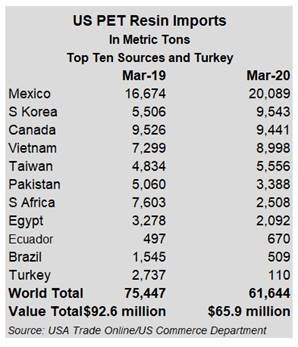 d to make single-use plastic bottles, containers, and packaging; carpet and flooring products; pillows and other home furnishing items. It is sometimes blended with recycled rPET.
d to make single-use plastic bottles, containers, and packaging; carpet and flooring products; pillows and other home furnishing items. It is sometimes blended with recycled rPET.
PET resin has been selling in the US in the low 40s cpp since early April, for spot truckload deliveries in the Midwest, Northeast and South. rPET repro, with an FDA letter of non-objection (LNO) designation, is now selling in the mid-to-high 60s cpp range, same delivery locations. The higher rPET price is due to a supply glut of PET resin—imports and US-produced—and steady, strong demand for rPET LNO, especially from consumer brand companies using more recycled PET in the production of bottles, containers and food-grade packaging.
Virtually all single-serving and two-liter bottles of sodas and water sold in the US are made from PET plastic, according to PETRA, the PET Resin Association.
--Reporting by Xavier Cronin, Xavier@petrochemwire.com;
--Editing by Joe Link, Joe@petrochemwire.com
Copyright, Oil Price Information Service
New York City’s curbside recyclables collection up by estimated 10-15%
May 6, 2020
New York City’s collection of plastic, glass and metal for recycling from residences is up by about 10-15% from normal levels since the COVID-19 outbreak in March, Thomas Outerbridge, general manager of Brooklyn-based Sims Municipal Recycling, said on Wednesday.
Sims Municipal receives all of NYC’s curbside recyclables at yards in Sunset Hill, Brooklyn; Long Island City, Queens; Hunts Point, Bronx, and Claremont Terminal in Jersey City, NJ.
The material recovery facilities took in an average of about 27,500-28,750 tons/month this year since the COVID-19 outbreak compared with an average of 25,000 tons/month of recyclables in 2019. Glass, paper and metal recycling each accounted for about a third of the total. This amounts to about a half-million truckloads/month of these comingled recyclables. Some recyclables are delivered via barge to the Claremont terminal.
Sims has been handling the increased loads while practicing social distancing procedures, Outerbridge said. This includes no paperwork “handoffs” between scale operators and truckers when loads are delivered. Instead, paperwork items, such as bills of lading, are photographed or otherwise confirmed without human contact.
Precautionary measures include designated trucker bathrooms, no visitors allowed at the yards and plexiglass barriers that separate sorters at conveyer belt lines not fully automated or operated by a single sorter. “Vigorous cleanings” of cranes and other machines and equipment are done after worker shifts. Workers’ temperatures are taken before they enter yards for work.
HDPE curbside bales have fallen in value from about 10 cpp FOB east of the Rockies before the outbreak to a current price of 3 cpp. This is due to a drop in demand from recyclers whose operations have been curtailed, and falling HDPE resin prices. At the same time, PET bale prices have been relatively steady during this period at 8-11 cpp, same terms and locations, primarily the result of strong demand from recyclers who produce rPET repro/pellet which is blended with prime and offgrade PET resin in the production of new water and beverage bottles, clamshells and plastic packaging.
--Reporting by Xavier Cronin, Xavier@petrochemwire.com;
--Editing by Joe Link, Joe@petrochemwire.com
Copyright, Oil Price Information Service
Homeland Security Sees Recycling as Critical to Manufacturing Supply Chain
March 26, 2020
Recycling produces materials that "essential" manufacturing sectors depend on, according to the Department of Homeland Security's Cybersecurity and Infrastructure Security Agency (CISA).
The CISA guidance offers clarity on recycling's role during the coronavirus disease 2019 (COVID-19) outbreak, which has forced many non-essential businesses to close. At the same time, CISA states that its guidance is not a directive. It is up to individual states and municipalities to decide on recycling policies during the outbreak emergency.
CISA spokesman Scott McConnell on Thursday referred to the agency's "Guidance on the Essential Critical Infrastructure Workforce" on its website. Critical infrastructure is dependent on "... materials and products needed for medical supply chains, and [on] supply chains associated with transportation, energy, communications, food and agriculture, chemical manufacturing, nuclear facilities, the operation of dams, water and wastewater treatment, emergency services, and the defense industrial base. Additionally, workers needed to maintain the continuity of these manufacturing functions and associated supply chains."
The Washington, D.C.-based Institute of Scrap Recycling Industries, in an email to members on March 25, states, "Recycled metal, paper, plastics, and other commodity-grade materials feed critical US manufacturing operations that are producing the rebar, wiring, tubing, transportation, packaging, and other key materials that are needed for everything from construction of new hospitals to the manufacture of new hospital beds, ventilators, toilet paper and other essential supplies needed to keep Americans safe and the economy running during this critical period."
Plastic recycling, in particular, has continued uninterrupted in many parts of the country.
"Waste Management [WM] is continuing to collect recycling," company spokeswoman Janette Micelli said in an email. WM is the largest U.S. trash hauler and one of the country's largest plastic recyclers. "The recyclable materials collected from homes and businesses go on to WM customers to create new essential products like tissue/toweling, and packaging boxes for medical and grocery supplies."
At the same time, WM has temporarily shut down or reduced hours at its materials recovery facilities in California, according to the company's website today.
Rumpke Waste & Recycling, which operates in Ohio, Indiana, Kentucky and West Virginia, has also continued its single-stream curbside recycling with no interruptions, said spokeswoman Gayane Makaryan. The company has seen a sharp rise in demand for plastic water bottles over the past week, she said.
Miami, for its part, has suspended curbside recycling "until further notice," instructing residents to put recyclables in their green trash carts, according to Miami Department of Solid Waste spokesman Mario F. Nunez.
Miami-Dade County, however, has continued its twice-monthly single-stream recycling operations from about 340,000 single-family homes, said Gayle Love, spokeswoman for the county's Department of Solid Waste Management.
--Reporting by Xavier A. Cronin, xavier@petrochemwire.com;
--Editing by Joe Link, joe@petrochemwire.com
Copyright, Oil Price Information Service
Bill aims to fix recycled plastics shortage
February 19, 2020
A bill proposed by two senators aims to increase the amount of recycled plastic available to large businesses to help them meet sustainability goals.
The Recycle Act, sponsored by Senators Rob Portman (R-Ohio) and Debbie Stabenow (D-Mich.) would authorize $15 million per year over five years in grants to help improve recycling education and outreach.
Businesses don’t have access to enough recycled plastic to include in their packaging because the rate of recycling is too low, Portman’s legislative assistant Sarah Peery told an audience Wednesday morning at the Recycling Plastics Conference in Nashville.
“The recycling rate in the U.S. is around 35%, but for plastics that number drops to less than 10%. Nearly $9 billion worth of recycled materials are thrown away each year,” Peery said.
The legislation would direct the Environmental Protection Agency to develop a model recycling program toolkit for states, local governments, Native American tribes, and partners to deploy to improve recycling rates and decrease contamination in the recycling stream.
Major U.S. manufacturers are creating recycling plans from everything to packaging to toys to beverages.
Mattel Inc. wants all its plastic toys and packaging to be recycled, recyclable or made from bio-based plastic by 2030.
Microsoft is looking at plastic packaging as well as using recycled plastics for some of its tablets.
PepsiCo Inc. wants to cut use of virgin plastic beverage packaging by more than a third by the middle of next decade. The soda and snack food giant said increased use of recycled plastic, as well as alternative packaging, will help the company reach its 35% reduction goal.
LIFEWTR is transitioning to 100% recycled PET in the U.S.
Yet, there is an annual gap of 1 billion pounds of polyethylene terephthalate (PET) between current U.S. supply and projected 2025 demand for use in bottles, according to The Recycling Partnership.
Consumer confusion on how to properly recycle is one of the top recycling challenges, according to industry groups.
Even among those who do recycle, reports have indicated that up to one-third of materials that are put into household recycling bins ultimately end up in landfills, either because the material is not recyclable or is not accepted by a company’s recycling program, Peery said.
“That is why education and outreach are necessary to both increase participation in recycling and decrease contamination in the recycling stream,” she added.
Key industry groups and businesses have offered support of the bill, including The Grocery Manufacturers Association, The American Chemistry Council, the American Beverage Association, Proctor & Gamble, and The Association of Plastic Recyclers.
“Our recycling infrastructure is in crisis and the consumer-packaged goods (CPG) industry commends the attention recycling is now getting in Congress,” said Grocery Manufacturers Association (GMA) President and CEO Geoff Freeman. “This industry is continuously innovating its packaging, making it more recyclable every day — but that recyclable packaging has increasingly fewer places to go as more cities and counties retreat from recycling programs.”
The Recycle Act would require the EPA to more frequently review and revise, if appropriate, its Comprehensive Procurement Guidelines, which designate products containing recycled materials and provides recommended practices for federal agencies to purchase such products.
--Reporting by Heather Doyle, heather@petrochemwire.com;
--Editing by Joe Link, joe@petrochemwire.com
Copyright, Oil Price Information Service
Bill would require 10-cent bottle deposit, pause on new plastics plants
NASHVILLE, February 18, 2020 (PCW) – A 10-cent deposit would be required on plastic and other bottles in all 50 states, while a pause of up to three years would be imposed on the building of new plastics production plants, under proposed legislation by Senator Tom Udall, D-NM, his senior policy adviser, Jonathan Black, said.
Black was speaking at a plastic recycling conference in Nashville.
The requirement is part of the Break Free From Plastic Pollution Act of 2020, a bill introduced in Congress on Feb. 11 by Udall, Representative Alan Lowenthal (D-CA), Senator Jeff Merkley (D-OR) and Representative Katherine Clark (D-MA).
The Act would also ban US plastic scrap exports to countries deemed to have poor records of recycling plastics, while plastic straws would be "available on request." It would also reduce and ban certain non-recyclable single-use plastic products, and establish minimum recycled content requirements for beverage containers, packaging, and food-service products.
The legislation will be reviewed by various Congressional committees as the legislative process begins.
When asked when Senate majority leader Mitch McConnell might bring the legislation up for consideration, Black said, “I assure you Mr. McConnell is hearing from constituents back home,” about plastic pollution. He added that this was an issue with bipartisan support like no other issue."
Also speaking was Sarah Peery, legislative assistant for Senator Rob Portman, R-OH. Peery summarized the RECYCLE Act, proposed this past November by Portman and Senator Debbie Stabenow (D-MI). The Act would create a federal grant program to help educate people about recycling programs.
--Reporting by Xavier A Cronin, Xavier@petrochemwire.com
--Editing by Joe Link, Joe@petrochemwire.com
Copyright, Oil Price Information Service
US PET imports dropped almost 15% in 2019
HOUSTON, February 5, 2020 (PCW) – US imports of PET resin totaled 806,242 metric tons in 2019, down by 14.8% from 2018, the latest US Commerce Department data show. The 2019 imports equal about 42,444 truckloads or 10,608 railcars.
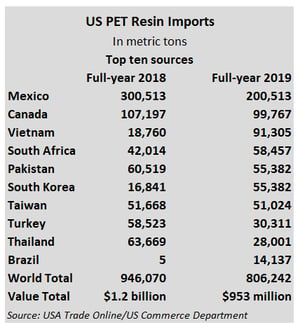 The 2019 imports, comprised of bottle-grade and high-viscosity PET resin, were valued at $953 million, down from $1.2 billion in 2018.
The 2019 imports, comprised of bottle-grade and high-viscosity PET resin, were valued at $953 million, down from $1.2 billion in 2018.
Much of this resin is used to produce single-use plastic bottles, containers and packaging. It is also used in the production of strapping tape and fibers to make home furnishing items like pillows.
Imports last year came from 43 countries. They were down by 33% from Mexico, the top source, at 25% of the 2019 total. They were up sharply from several countries, including Vietnam, the third top source of 2019 imports, and Egypt, the fourth top source.
PET imports fell last year due to rising use of recycled PET pellets and flake as consumer brand companies vow to use more of the material in the manufacture of bottles, containers and packaging.
--Reporting by Xavier Cronin xavier@petrochemwire.com
--Editing by Joe Link joe@petrochemwire.com
Copyright, Oil Price Information Service
US PET resin price drop 25% in 2019 on bloated supply, recycled demand
HOUSTON, January 8, 2020 (PCW) – Prices for prime PET resin, the plastic used to make bottles, containers and packaging, ended 2019 down by 25 percent from year-earlier levels on ample supplies and increased demand for recycled PET, according to PetroChem Wire’s Weekly Recycled Plastics Report.
Prices ended 2019 at 49 cpp for railcars (about 190,000 lbs) delivered east of the Rockies, down 16 cpp from the end of 2018. It was the biggest year-on-year decline since at least 2013, when PetroChem Wire started reporting prime PET prices.
The market was bloated with PET produced in the US and imported from 46 countries around the world. US PET imports totaled 691,344 metric tons (9,097 railcars) in Jan-Oct 2019, the most recent data from the US Commerce Department show. This was down 13% from PET imports in Jan-Oct 2018, but combined with robust North American PET production, gave US buyers a surplus of resin to choose from.
Mexico was the top source of US PET imports in the first 10 months of 2019 at 170,102 mt (1,978 railcars), or 25% of the total. Imports from South Africa, another major source, totaled 51,646 mt in the same 2019 period.
The US depends on imports from Mexico and the largest US producer, Dak Americas, is owned by Mexican chemical giant Alfa. (Dak has five PET manufacturing plants in the US and the Selenis PET plant near Montreal.
While supply was robust, demand dropped as big PET users, including consumer brand companies, increased their use of recycled (rPET) flake and pellet from 2018 levels. rPET is typically blended with offgrade and prime PET to produce new bottles, containers, packaging, strapping PET and other products.
Prime PET prices started 2020 little changed as buyers assessed how much PET they would need over the next three months ahead of the warm-weather season, which typically brings a rise in demand for single-use PET in North America. First-quarter 2020 PET resin business was done in the high 40s cpp for railcars delivered to end users and distributors.
Clear recycled PET pellets carrying an FDA letter of non-objection (LNO) ended 2019 at 64 cpp, down 9 cpp or 12% from late December 2018 (see graph). An LNO designation means the recycled PET has been approved for use to manufacture food-grade PET containers and packaging.
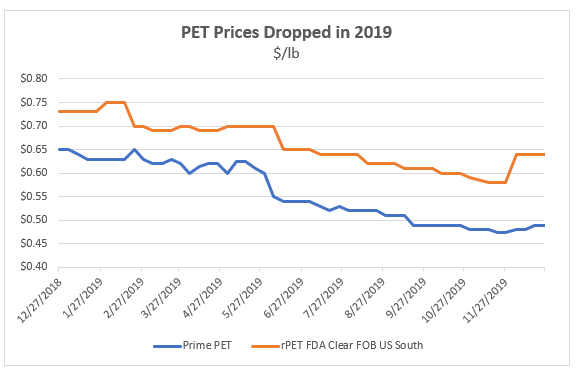
– Xavier A Cronin xavier@petrochemwire.com
Copyright, Oil Price Information Service
US exports of uncategorized plastic scrap drop 44 percent Jan-Aug
HOUSTON, November 1, 2019 (PCW) -- US exports of uncategorized plastic scrap, which includes polypropylene, totaled 162,421 metric tons in Jan-Aug, down by 44% from Jan-Aug 2018, the latest US Commerce Department data show. A crackdown on imports of scrap and rubbish by countries in Asia was a major reason for the drop. US plastic scrap and rubbish that is not exported or recycled is typically landfilled or becomes litter.
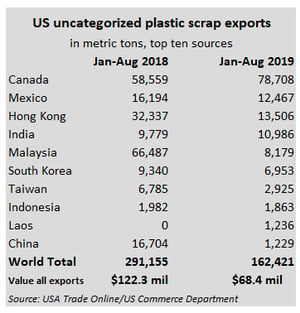 Uncategorized is one of five plastic scrap categories tracked by the US government for export and import; the others are PE, PET, PS and PVC. It does not break down the uncategorized category by sub-sectors. Plastic scrap and rubbish not in these major categories comes in all shapes and sizes. They include comingled numbers 3-7 plastic scrap—PVC, LDPE, PP, PS and ‘other’; bulky bloated rigid and oversized scrap, like 275-gallon HDPE HMW intermediate bulk containers (IBCs), used to hold chemicals at oil field operations and as part of totes for an assortment of liquids; and dirty PP super sacks used to carry perishables like guar gum, coffee and tea.
Uncategorized is one of five plastic scrap categories tracked by the US government for export and import; the others are PE, PET, PS and PVC. It does not break down the uncategorized category by sub-sectors. Plastic scrap and rubbish not in these major categories comes in all shapes and sizes. They include comingled numbers 3-7 plastic scrap—PVC, LDPE, PP, PS and ‘other’; bulky bloated rigid and oversized scrap, like 275-gallon HDPE HMW intermediate bulk containers (IBCs), used to hold chemicals at oil field operations and as part of totes for an assortment of liquids; and dirty PP super sacks used to carry perishables like guar gum, coffee and tea.
New destinations for plastic scrap exports during the first eight months of 2019 included Laos at 1,982 mt, up from none in the same 2018 months.
Canada and Mexico remained the top two destinations of uncategorized US plastic scrap exports; together they accounted for 91,175 mt in Jan-Aug 2019, or 56% of the total.
The US also imports plastic scrap; uncategorized plastic scrap imports totaled 118,242 mt in Jan-Aug 2019 or 6,223 truckloads (about 19 mt/truckload), down 13% from Jan-Aug 2018.
- Xavier A. Cronin, Xavier@petrochemwire.com
Copyright, Oil Price Information Service
US polyethylene scrap exports down 26% in August
HOUSTON, October 7, 2019 (PCW) – US exports of polyethylene scrap totaled 19,545 metric tons in August, or about 1,028 truckloads, down 26% from August 2018, the latest US Commerce Department data show.
Exports were down sharply to India, the top export destination in August 2018. Exports surged to Thailand at 3,203 mt in August 2019, up from 176 mt a year earlier. Exports to Turkey were 2,078 mt in August 2019, up from 781 mt in August 2018 (see table).
The value of all PE scrap exports in August 2019 was $7.8 million and $11.5 million in August 2018.
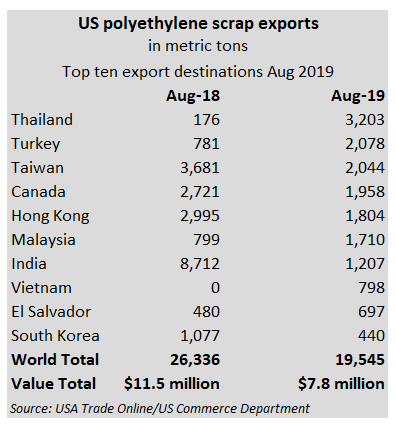
- Xavier A. Cronin, Xavier@petrochemwire.com
Copyright, Oil Price Information Service
PepsiCo water machine maker SodaStream joins Climate Strike
HOUSTON, September 20, 2019 (PCW) – SodaStream, a producer of sparkling water appliance-like machines, is closed on Friday in support of the Global Climate Strike.
This includes the company’s global e-commerce and head-office operations in San Francisco.
PepsiCo acquired SodaStream in summer 2018 for $3.2 billion. It is part of the company’s “Beyond the Bottle” initiative, which also includes flavored “Drinkfinity” pods put into reusable bottles filled with ice water.
PepsiCo acquired SodaStream as part of its “…goal to reduce absolute greenhouse gas emissions across its value chain by 20 percent by 2030 and commends SodaStream’s actions to support the Global Climate Strike,” PepsiCo spokeswoman Carrie Ratner said.
The Global Climate Strike web site states: “This September, millions of us will walk out of our workplaces and homes to join young climate strikers on the streets and demand an end to the age of fossil fuels.”
Demonstrations led by schoolchildren are occurring in hundreds of cities around the world, the BBC reported on Friday.
- Xavier A. Cronin, Xavier@petrochemwire.com
Copyright, Oil Price Information Service
US polyethylene scrap exports fell 21% In July; India, Turkey top destinations
HOUSTON, September 17, 2019 (PCW) – US exports of polyethylene scrap totaled 23,253 metric tons or 1,224 truckloads in July, down 21% from July 2018, the latest US Commerce Department data show. A standard tractor-trailer truck used for transporting commodities typically carries about 19 mt.
The fall in polyethylene scrap exports was due primarily to lower shipments to Asian countries. At the same time, some scrap exported this past July found its way to countries to which there were no exports in July 2018, including Angola, Brazil, Burma, Djibouti, France, Ghana, Greece, and South Africa, but in small quantities. (See table).
PE scrap is the largest by volume of the five plastic scrap categories tracked by the US government for export. US plastic scrap originally targeted for export but not being exported typically ends up buried in landfills, sold or given away for recycling, or discarded.
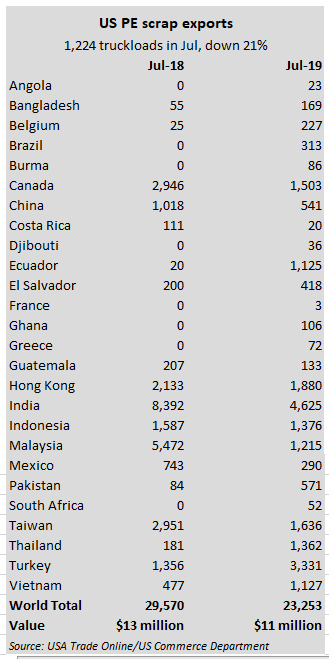
- Xavier A. Cronin, Xavier@petrochemwire.com
Copyright, Oil Price Information Service
Congressman’s proposed act would ban sale of plastic bottles in National Park System
HOUSTON, September 12, 2019 (PCW) – The sale of single-use plastic bottles would be banned at US National Park System locations, including National Parks, under proposed legislation by Rep. Mike Quigley of Illinois.
“Too often, plastic water bottles end up polluting national parks and clogging our waterways,” Quigley said in a press release on September 6, following a trip he made to Yellowstone National Park. “Reinstating President Obama’s common sense, flexible ban on single-use plastic water bottles will help ensure that our natural wonders are around for generations to come.”
The Reducing Waste in National Parks Act, House-Resolution 4236, would restore “Obama-era guidance banning the sale of single-use plastic water bottles in national park facilities, where possible,” the release states.
The Act has been referred to the US House Committee on Natural Resources as the first stage of the legislative process. “The Congressman is working to add as many co-sponsors to the legislation as possible in the hopes of moving it forward,” Quigley’s spokeswoman Victoria Oms told PCW.
‘Where possible’ refers to discretion National Park System directors have to adopt such a ban, a source close to the situation explained. The National Park System is comprised of 419 areas, including national parks, monuments, battlefields, military parks, historical parks, historic sites, lakeshores, seashores, recreation areas, scenic rivers and trails, and the White House, according to its website.
A spokesman with the White House Press Office said that a request for comment on Quigley’s remarks on September 11 had been sent to the Executive Office of the President; no response had been received as of the early afternoon of September 12.
The National Park Service’s Jeremy Barnum, acting assistant director of communications, said in an email, “As a general policy, the National Park Service does not comment on proposed legislation for which we have not provided congressional testimony,”
- Xavier A. Cronin, Xavier@petrochemwire.com
Copyright, Oil Price Information Service
US awash in PET resin, imports and domestic; pushing rPET prices down
HOUSTON, September 5, 2019 (PCW) -- US PET resin imports in 1H totaled 429,255 metric tons, or 8.6 million truckloads, the latest US Commerce Department data show.
This is down 11% from 1H 2018 imports, but combined with robust US PET production, supply is ample. PET prices at the start of September are in the low 50s cpp, down 21.5% from the start of 2019.
The PET market is “severely oversupplied, with a never ending downwards price trend,” said a US-based PET importer/distributor.
Both rPET and prime PET are used to produce single-use bottles and containers, single-use packaging, carpeting and other flooring industry products.
Lower PET prices have caused some end users to bypass their normal purchasing of recycled PET, or rPET, and have driven down these prices.
The bloated PET market underscores the high cost of recycling the most common consumer plastic, relative to fresh PET pellet made from burning hydrocarbons. The costliest rPET is clear repro, used for food-grade use, with prices currently in the low 60s cpp, a dime cheaper than prime resin, and down 15% from the start of 2019.
Prices for other rPET commodities, like recycled flake from post-consumer rubbish, have also fallen. A US rPET flake importer said earlier this week that he’s been unable to get his asking price of 47 cpp for packaging-grade rPET flake, with 10% contaminates, as customers opt for prime or offgrade PET, which sells as low as the mid-40s cpp. “I’m not doing any orders right now,” he said. “There’s just too much PET around.”
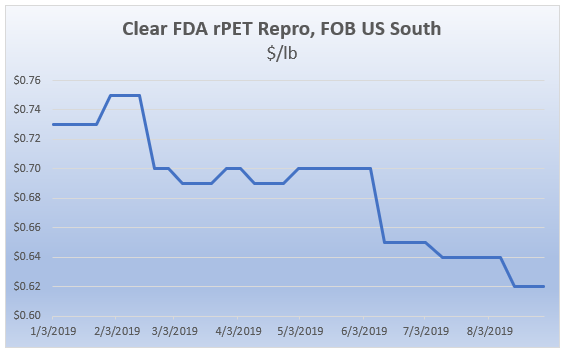
- Xavier A. Cronin, Xavier@petrochemwire.com
Copyright, Oil Price Information Service
US plastic trash exports drop 47% in January-June, surge to Senegal
HOUSTON, August 20, 2019 (PCW) – US exports of plastic scrap totaled 352,494 metric tons (about 17,624 truckloads) in Jan-Jun 2019, down 47% from Jan-Jun 2018, the latest US Commerce Department data show (see tables). Plastic scrap imports fell 10% in the same periods.
Exports to China, once the top destination of US plastic rubbish exports, totaled 4,887 mt in 1H 2019, or about 244 truckloads, down 83% from exports in 1H 2018.
Plastic rubbish sold as commodities is typically recycled into ‘regrind’ flake, ‘repro’ pellet, or post-consumer resin (PCR) pellet. Flakes and pellets are often blended with prime plastic resin pellets or used independently to manufacture new single-use packaging, containers and bags, single-use bottles, jugs, cups and utensils, auto parts, auto battery holders, plastic furniture, medical devices, and a host of other products.
The five plastic scrap categories tracked by the US government for imports and exports are PE, PET, PVC, PS and ‘other,’ which includes scrap like polypropylene curbside bales and comingled plastic trash.
The value of the scrap exports in 1H 2019 was $149.8 million, down from $270.6 million a year earlier.
In the polystyrene export category, the West African country of Senegal was the top destination in 1H 2019 at 5,761 mt, up from zero in 1H 2018.
The greatest volume of exports in 1H 2019 by category was polyethylene scrap, at 151,776 mt, down 37% from 1H 2018. The top destination of PE scrap exports in 1H 2019 was India at 56,013 mt.
9,956 truckloads of plastic trash imported in 1H 2019
US plastic scrap imports, meanwhile, in 1H 2019 totaled 199,130 mt—about 9,956 truckloads--down 10.4% from 1H 2018.
The top import category by volume in 1H 2019 was PET at 69,653 mt, down 4.3%. Mexico was the top source of 1H 2019 PET scrap imports at 18,578 mt, or 26.7% of the total.
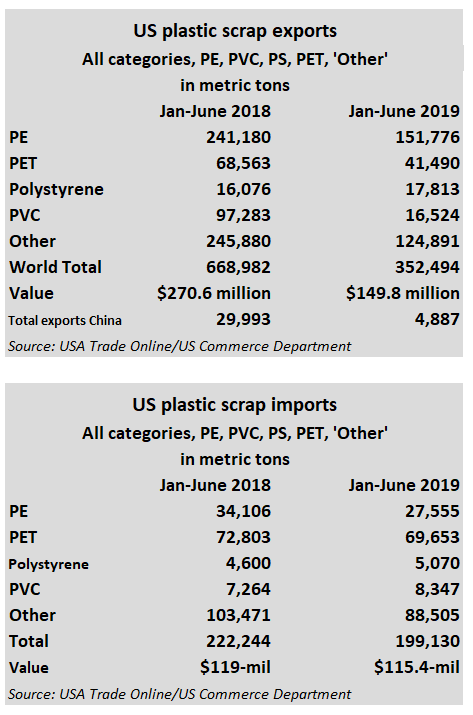
– Xavier A Cronin, xavier@petrochemwire.com
Copyright, Oil Price Information Service
US polyethylene scrap exports down sharply in April; Top export destination is now India
Houston, June 21, 2019 (PCW) – US exports of PE scrap totaled 27,325 metric tons in April, down by 39.4% from April 2018, the latest US Commerce Department data show.
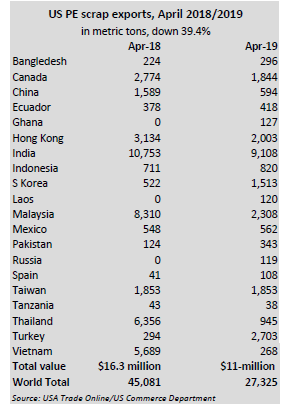
Plastic pollution in oceans and on coastlines has been a major factor lowering demand for plastic scrap as a commodity exported to many Asian countries. At the same time, US exports of PE scrap – the largest of five plastic scrap export and import categories tracked by the US government – did increase to several countries in April, including Turkey, at 2,703 mt compared to 294 mt in April 2018.
- Xavier A Cronin, Xavier@petrochemwire.com
Copyright, Oil Price Information Service
A Shot at Redemption: Long Island’s PQ Recycling takes all redemption PET bottles, all the time; Regional ‘Reclaimer’ in business since 2012
East Farmingdale, New York – June 20, 2019-- George Smilow walks in the PET recycling plant toward the loading dock where there’s a tractor-tailor half-filled with--what else?—water and soda bottles scrunched in bales. Another truck, another 40,000 pounds of PET from redemption centers in New York State, with an occasional load from nearby Connecticut and other New England states.
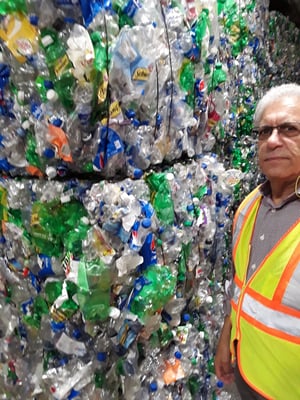
About 30 trucks a week chug out to Polyquest Recycling’s 70,000-square-foot plant in an industrial sector of East Farmingdale on Long Island, an hour by bus and subway to Midtown Manhattan.
Smilow is the chief operation officer at PQ Recycling. He’d been a plant operator and production manager in the pharmaceutical, sugar refining, and soft drink industries when an opportunity arose. It was 2012, and he and his partners bought a PET recycling plant which had been idle for a few months. It was built in 1992 in response to New York State’s bottle bill, enacted in the early 1980s, and began business at the time as Pure Tech/APR Plastics Products.
The plant was restarted, renamed and it’s been a good run for PQ Recycling since, Smilow says. The plant has run 24-7 uninterrupted and plans are underway for new equipment and machinery (details were not disclosed.)
No Curbside, please
PQ Recycling is one of about 25 PET “reclaimer” plants in the US. A new one is being built in the Reading, Pennsylvania area by CarbonLITE, which has existing reclaimer plants in Riverside, CA, and Dallas, TX.
PQ Recycling wants redemption – all redemption, all the time. These are PET bottles that cost a dime (in New York state), but can be redeemed for a dime after stuffing them into the crunching get-your-money-back machines at supermarkets, which spit out a credit receipt.
PQ Recycling does not accept ‘curbside PET bales’. These comprise the highest volume of PET bottles that are recycled. There are currently only 10 states with bottle bills which require a deposit for PET bottles; redemption centers are limited to these states.
Curbside bales are comprised of PET bottles and containers collected from residences and businesses, typically in weekly collections by municipalities and MRFs (materials recovery facilities, middle-man trash haulers and sorters.) Reclaimers source curbside bales from several hundred locations in the US, Canada and Mexico. Custom Polymers in Athens, AL, for instance, draws on about 300 sources for its curbside bales. Some reclaimers take in a mix of redemption and curbside. California, for example, has six reclaimer plants. A major source of their curbside and redemption bales is the Plastic Recycling Corp of California, which buys bales in a twice-monthly bid offering auction.
PET peeves
A forklift driver spears a bale from the tractor-trailer at the PQ Recycling loading dock and backs out with warning-horn beeping. It delivers it to a sorting line conveyor belt which rises like a roller coaster approaching its pre-plunge peak. On the side, two of the PQ Recycling’s 40 workers separate out cans, plastic wrapping and anything else that may have made its way into the bales.
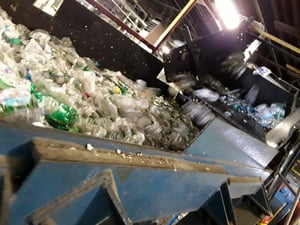
The inside of the plant is crowded with manual sorters, optical sorters, grinders, flotation tanks, boilers, sludge bins, control rooms. Inspectors in white coats test fresh flake batches in lab rooms. There are dozens and dozens of white sacks, five feet high, weighing about 1,500 pounds, bursting at the seams with clear rPET flake (US Food & Drug Administration certified for food-grade use). They sit bloated on the floor, ready for shipment to PET bottle makers—typically to be pelletized before production of PET preforms for bottle production. Other flake customers include plants manufacturing PET sheet for packaging and for use in the fiber and PET strapping sectors.
PQ Recycling also does a niche business in bottle-cap regrind, typically comprised of about 55% PP/45% PET or HDPE. It is a flake of many colors – just look at your next bottle cap of soda pop or bottled water-- – Coke red, Pepsi blue, Sprite, green, Fanta, orange-- and a mix of “oddball colors,” as Smilow calls them. PQ’s bottle-cap regrind is sold mostly to compounders in the US and Canada.
PET Peeve/Better Recycle Than Not
With thousands and thousands of PET bales coming in each month, the most important spec is that they produce a net 80% PET yield; this compares with curbside PET bales which average, depending on state and location, a 60-70% yield. This is mainly due to more moisture, dirt and non-PET material in curbside bales than their redemption brethren.
Smilow’s PET peeve? “There’s not much trash in the bales, but a lot of cans must be separated out,” says Smilow. “There are labels [on bottles] that are non-floating and difficult-to-remove, and there are non-PET compounds incorporated in [the PET] resin” itself, which are difficult to recycle.
There’s always redemption in recycling, Smilow believes: “Recycling could be worse,” the father of five and Long Island resident says with sardonic humor as he strides by a PET sludge basin. “Actually, there’s renewed interest in recycling in the context of the global environment and all that. Recycling is better than not recycling.”
- Xavier A Cronin, Xavier@petrochemwire.com
Copyright, Oil Price Information Service
Construction begins on $260 million Indiana plastic rubbish conversion plant
HOUSTON, May 22, 2019 (PCW) – A ground breaking was held today for a plant that will convert plastic waste, such as toys, film, Styrofoam and packaging, into diesel, blendstocks and wax, said Jamie Nolan, spokeswoman for the company building the plant, Brightmark Energy.
Startup is expected in mid-to-late 2021.
The plant is being built in Ashley in northeastern Indiana near the Ohio state line. It is expected to convert 100,000 tons/year of post-consumer and post-industrial plastic rubbish from Indiana and the Chicago area into 18 million gallons of ultra-low sulfur diesel and naphtha blendstocks, and about 6 million gallons of commercial-grade wax.
BP has contracted to purchase the diesel and blendstocks for regional distribution; AM Wax, based in La Mirada, CA, has contracted for the wax, Nolan said.
The $260 million plant financing includes $185 million in Indiana green bonds, according to Brightmark.
- Xavier A Cronin, Xavier@petrochemwire.com
Copyright, Oil Price Information Service
PET imports, worth $92.7 mil, down 14% in March; Malaysia top export spot
HOUSTON, May 14, 2019 (PCW) – US PET resin imports in March totaled 75,447 metric tons, down by 14% from March 2018, the latest US Commerce Department data show. The imports’ value was $92.7 million in March 2019 and $112.2 million a year earlier.
Mexico was the top source of imports in March at 16,674 mt, although this was down by 51% from March 2018. Imports were sharply higher from Vietnam at 7,299 mt in March 2019 compared to 113 mt a year earlier. Taiwan chemical giant Far Eastern operates a 400,000 mt/year PET plant in Vietnam.
Imports in March 2019 from Egypt were 3,278 mt and from South Africa they totaled 7,603 mt, compared to zero from each country a year earlier.
US PET exports, meanwhile, totaled 5,329 mt in March, down 6% from a year earlier. Malaysia was the top export destination in March 2019 at 1,538 mt compared to zero in March 2018.
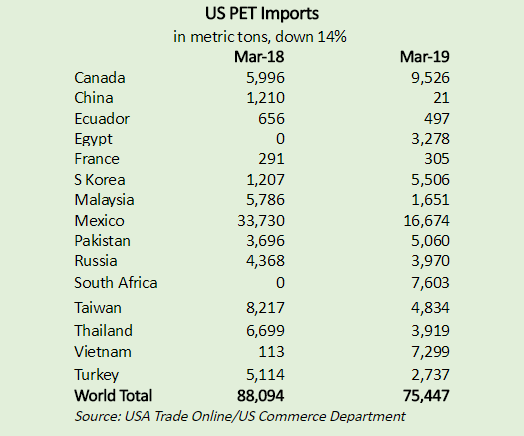
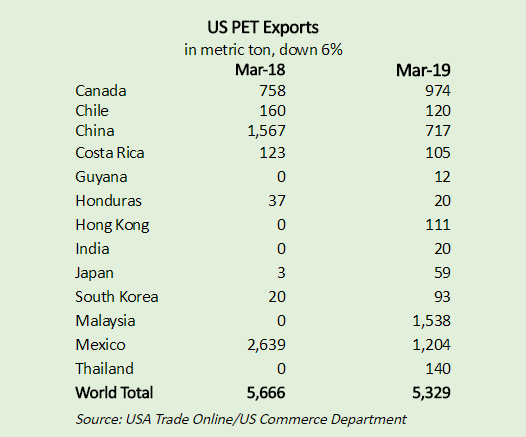
- Xavier A Cronin, Xavier@petrochemwire.com
Copyright, Oil Price Information Service
PET recycling plant now planned for Greater Reading, PA
HOUSTON, May 14, 2019 (PCW) – A new PET recycling plant with capacity of about 2 billion bottles/year will be built in Greater Reading, PA, with a startup expected in 1Q 2020, the Greater Reading Chamber Alliance announced on Monday.
The plant will be built in Muhlenberg Township, Berks County, by US PET recycler CarbonLITE Industries at a cost of about $80 million. It will measure 270,000 square feet and employ about 100 people.
It was originally planned for Lehigh Valley, PA.
CarbonLITE’s recycling plants are in Riverside, CA, and Dallas, TX.
- Xavier A Cronin, Xavier@petrochemwire.com
Copyright, Oil Price Information Service
Maine bans single-use PS, including ‘party cups’; industry groups object
HOUSTON, May 8, 2019 (PCW) – The state of Maine has banned single-use polystyrene food containers, like takeout clamshells, “red party cups” and egg cartons, effective January 2021, according to the state’s web site.
The ban’s original date was Jan 1, 2020, but it was amended to give the food service industry more time to adjust, the bill’s sponsor, Stanley Paige Zeigler Jr, told PCW on Wednesday.
In a press release on Apr 30 announcing the ban,” Governor Janet Mills said, “Polystyrene cannot be recycled like a lot of other products. So while that cup of coffee may be finished, the Styrofoam cup it was in is not.”
Lynn Dyer, executive director of the Foam Recycling Coalition (FRC), said her group opposes the decision.
“Don’t tell me you can’t recycle foam,” she said on Wednesday, referencing a map which shows dozens of PS recycling locations in the US and Canada.
The FRC was formed in 2014 and is part of the Foodservice Packaging Institute.
Maine’s decision to ban foam foodservice packaging is a lose-lose-lose situation,” Dyer said. “Restaurants and other foodservice establishments lose out because of limited packaging options, growing end markets for recycled foam lose out because their supply is cut off and residents lose out because the state’s litter and marine debris challenges will not have been solved.
Fourteen towns and cities in Maine have already banned single-use PS, according to the state’s release. Several large US cities have also banned this material, including San Francisco and New York.
The American Chemistry Council released a statement after the ban was announced. It reads in part, “Polystyrene foam packaging is a safe, recyclable, durable, and cost-effective product for use in foodservice. The U.S. Food and Drug Administration for decades has determined that polystyrene is safe for use in contact with food. A ban on polystyrene foodservice packaging could lead to increased solid waste, energy use, water use, and greenhouse gas emissions…It is our sincere hope that Governor Mills and the Maine Legislature will reconsider this legislation next year after they see how it will negatively impact the environment and local businesses and consumers.”
Gov. Mills’ spokeswoman was not immediately available for comment on Wednesday afternoon.
- Xavier A Cronin, Xavier@petrochemwire.com
Copyright, Oil Price Information Service


 The 2019 imports, comprised of bottle-grade and high-viscosity PET resin, were valued at $953 million, down from $1.2 billion in 2018.
The 2019 imports, comprised of bottle-grade and high-viscosity PET resin, were valued at $953 million, down from $1.2 billion in 2018.
 Uncategorized is one of five plastic scrap categories tracked by the US government for export and import; the others are PE, PET, PS and PVC. It does not break down the uncategorized category by sub-sectors. Plastic scrap and rubbish not in these major categories comes in all shapes and sizes. They include comingled numbers 3-7 plastic scrap—PVC, LDPE, PP, PS and ‘other’; bulky bloated rigid and oversized scrap, like 275-gallon HDPE HMW intermediate bulk containers (IBCs), used to hold chemicals at oil field operations and as part of totes for an assortment of liquids; and dirty PP super sacks used to carry perishables like guar gum, coffee and tea.
Uncategorized is one of five plastic scrap categories tracked by the US government for export and import; the others are PE, PET, PS and PVC. It does not break down the uncategorized category by sub-sectors. Plastic scrap and rubbish not in these major categories comes in all shapes and sizes. They include comingled numbers 3-7 plastic scrap—PVC, LDPE, PP, PS and ‘other’; bulky bloated rigid and oversized scrap, like 275-gallon HDPE HMW intermediate bulk containers (IBCs), used to hold chemicals at oil field operations and as part of totes for an assortment of liquids; and dirty PP super sacks used to carry perishables like guar gum, coffee and tea.








 Get news, analysis and exclusive data on climate and business, free in your inbox every week.
Get news, analysis and exclusive data on climate and business, free in your inbox every week. 
